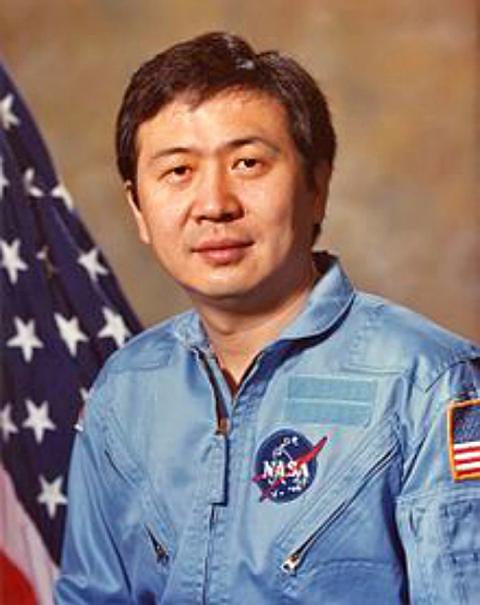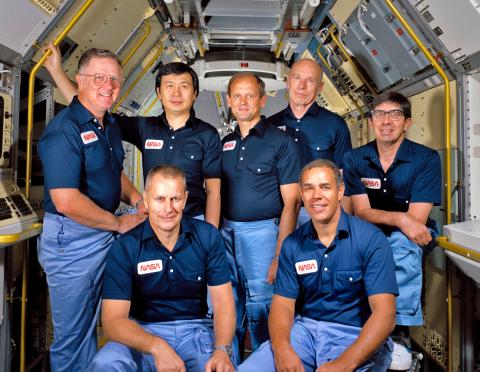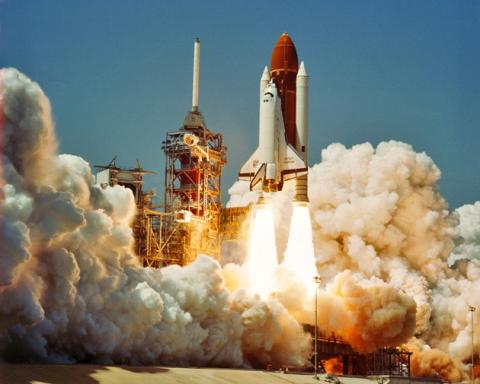Taiwan in Time: April 25 to May 1
Before Taylor Wang (王贛駿) set out for outer space, he asked his NASA supervisors if he could bring with him a Republic of China flag — but his request was refused on the grounds that the US did not have diplomatic ties with the Taiwan-based government.
“I was really mad, but the commander told me it would be futile even if I took the issue to the White House,” he writes in his memoir, If I Can, So Can You (我能, 你也能). “But then he told me although it is against the rules to secretly bring items onto the shuttle, nobody was going to check. I thought what he said was very interesting and stopped arguing.”

Photo courtesy of Wikimedia Commons
That’s all he reveals in his memoir — and depending which side of the Taiwan Strait you ask, he either presented a People’s Republic of China flag to Beijing during his visit in July 1985, or handed a Republic of China flag that he allegedly hid in his undershirt to premier Yu Kuo-hwa (俞國華) when he arrived in Taiwan a month later. Some accounts say he did both.
In his memoir, he also writes that he agreed to carry several flags for the Wang clan association in Taiwan. In addition, the Los Angeles Times reported after his return that he also brought the Los Angeles and Glendale (where he resided) city flags into space, so it really is unclear how many flags he took with him.
Born in China and spending his formative years in Taiwan, Wang blasted off into space on April 29, 1985. He almost did not make it back — investigations on the Challenger accident a year later revealed that a similar disaster could have happened on Wang’s flight, according to a NASA oral history account by crew member Don Lind.

Photo courtesy of Wikimedia Commons
“You came within three-tenths of a second of dying,” Lind recalls the engineers telling him.
Wang was born during World War II. His father was a public servant who helped the Chinese Nationalist Party (KMT) ship items from the national treasury to Taiwan during their retreat after losing the Chinese Civil War. The Communists soon took over and he fled to Taiwan after they accused him of stealing from the country. His children arrived in 1951.
Wang writes that he was somewhat of a delinquent during his time at the Affiliated High School of National Taiwan Normal University and failed his college entrance exam. Studying on his own while working for a shipping company, he made it into University of California-Los Angeles in 1963 as a physics major.

Photo courtesy of Wikimedia Commons
A decade and a PhD later, Wang’s liquid drop dynamics experiments with the jet propulsion lab at California Institute of Technology were selected for the seventh journey of Space Shuttle Challenger, then set for 1980.
Wang’s team started modifying their experiments for zero gravity right away — but they had to wait another decade before the flight took place due to various delays.
“I focused on designing and testing the experiment instruments, and I always thought it would be an astronaut who would carry them out,” he writes. “I never thought they would want the scientist to personally go into space.”
Things changed in 1982 when NASA decided to allow non-astronaut scientists to join their space missions. Wang submitted an application, and a few months later he was officially named a crewmember as a “payload specialist” — a scientist chosen outside of the NASA astronaut selection process to conduct experiments or other duties.
In the ensuing media frenzy, he was portrayed in the US as someone who broke the race barrier — though he writes that the Taiwanese media tried to dig up dirt on him by publishing his high school transcripts, which he claims were not his, though he admits to having poor grades.
After rigorous training (and crashing several computer-simulation flights), Wang and another scientist made the final cut to join the astronauts. There were 14 space experiments onboard and Wang was in charge of six of them, including his own.
Things were rough from the start — his experiment equipment malfunctioned before he could even get started.
“I cannot accept this kind of failure,” he wrote. “I would rather have the shuttle malfunction, or a heart attack.”
When Wang finally fixed the problem on the fourth day, his celebratory screams reportedly woke the entire shuttle up. He proceeded to work almost nonstop, ignoring the monkey feces that had leaked from a cage (there was a monkey on board), and finished his work on the sixth day.
Then he could relax a bit. The shuttle flew past China four times a day — and Wang noted that it was the first time he had seen his birth country in 35 years. He lamented that he could not see Taiwan, where he “matured and discovered his life goals,” and also where his father was buried.
There was a minor scare before the shuttle landed — the indicator light for the shuttle door remained “open” even after the crew pressed the close button. If the door were really open, all of them would have died. Luckily, it was just a light malfunction.
The shuttle landed on May 6. In 168 hours in space, Wang had traveled about 4.7 million kilometers and orbited the Earth 110 times.
Taiwan in Time, a column about Taiwan’s history that is published every Sunday, spotlights important or interesting events around the nation that have anniversaries this week.

In the March 9 edition of the Taipei Times a piece by Ninon Godefroy ran with the headine “The quiet, gentle rhythm of Taiwan.” It started with the line “Taiwan is a small, humble place. There is no Eiffel Tower, no pyramids — no singular attraction that draws the world’s attention.” I laughed out loud at that. This was out of no disrespect for the author or the piece, which made some interesting analogies and good points about how both Din Tai Fung’s and Taiwan Semiconductor Manufacturing Co’s (TSMC, 台積電) meticulous attention to detail and quality are not quite up to

April 21 to April 27 Hsieh Er’s (謝娥) political fortunes were rising fast after she got out of jail and joined the Chinese Nationalist Party (KMT) in December 1945. Not only did she hold key positions in various committees, she was elected the only woman on the Taipei City Council and headed to Nanjing in 1946 as the sole Taiwanese female representative to the National Constituent Assembly. With the support of first lady Soong May-ling (宋美齡), she started the Taipei Women’s Association and Taiwan Provincial Women’s Association, where she

Chinese Nationalist Party (KMT) Chairman Eric Chu (朱立倫) hatched a bold plan to charge forward and seize the initiative when he held a protest in front of the Taipei City Prosecutors’ Office. Though risky, because illegal, its success would help tackle at least six problems facing both himself and the KMT. What he did not see coming was Taipei Mayor Chiang Wan-an (將萬安) tripping him up out of the gate. In spite of Chu being the most consequential and successful KMT chairman since the early 2010s — arguably saving the party from financial ruin and restoring its electoral viability —

It is one of the more remarkable facts of Taiwan history that it was never occupied or claimed by any of the numerous kingdoms of southern China — Han or otherwise — that lay just across the water from it. None of their brilliant ministers ever discovered that Taiwan was a “core interest” of the state whose annexation was “inevitable.” As Paul Kua notes in an excellent monograph laying out how the Portuguese gave Taiwan the name “Formosa,” the first Europeans to express an interest in occupying Taiwan were the Spanish. Tonio Andrade in his seminal work, How Taiwan Became Chinese,